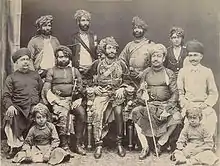Nawab of Junagarh
Nawab of Junagarh or Junagadh refers to the now defunct ex-lineage of rulers of the princely Junagarh State in British Raj, nowadays Junagadh district in the state of Gujarat in India. There are still several forts and palaces in India which were owned by princely Junagarh family but after Partition of India, this property was claimed by the Indian Government.[1][2][3]

List of Nawabs of Junagarh
Given below is the list of Nawabs who ruled in the princely Junagarh State before the Partition of India. After the independence of India and Pakistan in 1947, the title of Nawab of Junagarh has no official status. It still carries respect in Pakistan and is used as a courtesy title.[4][5][6]
| Lineage | |||||
|---|---|---|---|---|---|
| Nawab | Reign | Life | |||
| 1st | Nawab Muhammad Bahadur Khanji or Muhammad Sher Khan Babi[7] | 1730 – 28 Sep 1758 | died 1758 | ||
| 2nd | Nawab Muhammad Mahabat Khanji l | 28 Sep 1758 – 1760 | died 1774 | ||
| Nawab Muzaffar Khanji | 1760–1762 | ||||
| 2nd | Nawab Muhammad Mahabat Khanji | 1762 – 2 Dec 1774 | died 1774 | ||
| 3rd | Nawab Muhammad Hamid Khanji | 2 Dec 1774 – 26 Feb 1811 | 1766–1811 | ||
| 4th | Nawab Muhammad Bahadur Khanji II | 26 Feb 1811 – 26 May 1840 | 1795–1840 | ||
| 5th | Nawab Muhammad Hamid Khanji II | 26 May 1840 – 1851 | 1828–1851 | ||
| 6th | Nawab Sir Muhammad Mahabat Khanji II | 1851 – 29 Sep 1882 | 1838–1882 | ||
| 7th | Nawab Sir Muhammad Bahadur Khanji III | 29 Sep 1882 – 21 Jan 1892 | 1856–1892 | ||
| 8th | Nawab Sir Muhammad Rasul Khanji Babi | 23 Jan 1892 – 22 Jan 1911 | 1858–1911 | ||
| 9th | Mr. H.D Rendall ESQR, Administrator of Junagarh | 1911–1920 | |||
| 10th | Nawab Muhammad Mahabat Khanji III[8] | 22 Jan 1911 – 25 Feb 1948 | 1900–1959 as the last 'de facto' Nawab. | ||
Last Nawab
The Partition of India in 1947 resulted in the exile of Nawab Muhammad Mahabat Khanji III, who was the last ruling Nawab of Junagarh. The Nawab, being Muslim, was in favor of declaring the state as part of newly created Muslim majority Pakistan. For this purpose he signed the documents for incorporation of its state in Pakistan,in response rulers of two states that were subject to the suzerainty of Junagadh—Mangrol and Babariawad—reacted by declaring their independence from Junagadh and acceding to India. In response, the Nawab of Junagadh militarily occupied the states, Sardar Patel saw this as an aggression upon State of India and called for military response. However, Jawaharlal Nehru waited to first establish the validity of accession of principality of Babariawad to India. Once this was established with Lord Mountbatten, on 22 September 1947, they sent a telegram to Dewan of Junagadh clarifying the legality of accession and to withdraw their troops from Babariawad. Further, Indian Army was ordered to go to Babariawad and get the territories in India's possession. The Nawab of Junagadh refused to vacate his troops from Babariawad and Mangrol. In October, 1947 Nawab of Junagarh fled with his family to Pakistan. The Indian Army finally entered and occupied Babariawad in November 1947 and stood on alert along borders of Junagadh and Mangrol for further orders. leading to the integration of Junagadh into. After his exile, he settled down in Pakistan and the Junagarh family resides at the 'Junagarh House' in Karachi, Pakistan.[9]
After one year under Indian administration the Indian Government held a referendum asking the people of state to agree to be part of India.
See also
References
- Royal Junagadh Palace
- Juagadh Fort
- History of Junagadh
- Reviving the Junagarh issue: BACKGROUNDER Retrieved Daily Dawn, 9 Nov 2001
- The Story of the Accession of the Princely State of Junagarh Retrieved The Ground Report India, 30 January 2011
- rulers.org/indstat1.html
- Last Days of Junagadh Retrieved Memon World News
- The Maharaja of Junagadh, Nawab Sir Mahabet Khanji III
- Junagadh House Karachi Retrieved Indian Express, 21 January 2004
